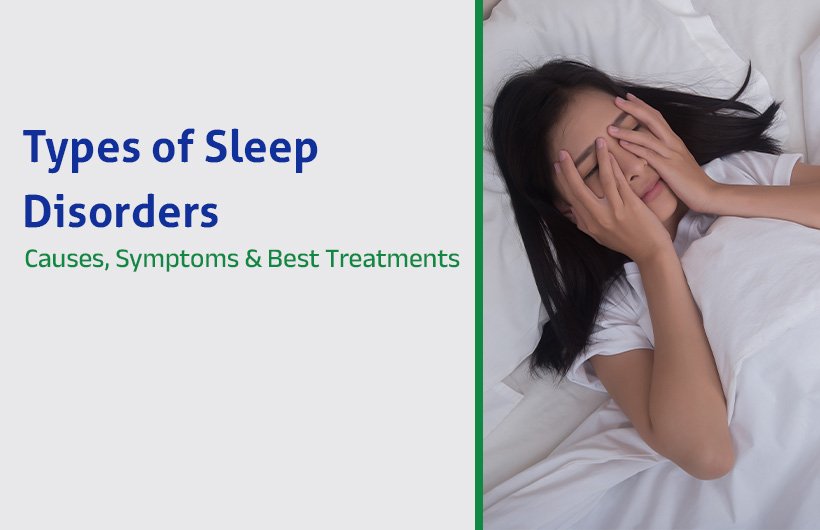Getting quality sleep is vital for overall health and well-being. Many individuals, however, suffer from poor or disturbed sleep without realising they may have an underlying sleep disorder. These disorders can affect daily energy, mood, concentration, and even heart health if left untreated. Dr Kunal Waghray, a renowned Pulmonologist in Hyderabad, emphasises that early diagnosis and appropriate treatment of sleep disorders can greatly enhance sleep quality and promote better overall health.
What Are Sleep Disorders?
A sleep disorder affects your ability to fall asleep, stay asleep, or enjoy restorative rest. While occasional sleep problems may result from stress or lifestyle changes, frequent disturbances could signal an underlying condition. Untreated sleep disorders can cause daytime fatigue, irritability, and poor concentration, and over time, may increase the risk of serious health issues like diabetes, high blood pressure, obesity, and heart disease. Expert Sleep Disorders Treatment in Hyderabad can help identify the cause and restore healthy, restful sleep.
Different Types of Sleep Disorders
There are many types of sleep disorders, and each one affects the body differently. Here are some of the most common ones:
1) Insomnia
Insomnia is the most common sleep disorder. People with insomnia find it difficult to fall asleep or stay asleep, even when they have the chance to rest. It can be short-term (caused by stress or life changes) or chronic (lasting for months or longer).
2) Sleep Apnea
Sleep apnea occurs when you’re breathing repeatedly stops and starts during sleep. This can cause loud snoring, choking, or gasping at night and excessive tiredness during the day. It is a serious condition that requires medical attention, as it can affect heart and brain health.
3) Restless Legs Syndrome (RLS)
This condition causes uncomfortable sensations in the legs and an uncontrollable urge to move them, usually at night. It can make it difficult to fall asleep or stay asleep.
4) Narcolepsy
Narcolepsy is a neurological disorder that affects the brain’s ability to control sleep-wake cycles. People with narcolepsy may suddenly fall asleep during the day, even while talking or eating.
5) Circadian Rhythm Disorders
These occur when your body’s internal clock is out of sync with your environment. Common examples include jet lag or shift work disorder, where your sleep schedule doesn’t match your daily activities.
6) Parasomnias
Parasomnias are abnormal behaviours during sleep, such as sleepwalking, night terrors, talking in sleep, or teeth grinding. These can sometimes be linked to stress, medications, or other health issues.
What Causes Sleep Disorders?
Sleep disorders can have many different causes. Some of the most common include:
- Stress and anxiety: Mental or emotional stress can make it difficult to relax and fall asleep.
- Poor sleep habits: Irregular sleep schedules, screen time before bed, and caffeine intake can disrupt your natural sleep cycle.
- Medical conditions: Issues like asthma, arthritis, thyroid problems, and heartburn can affect sleep quality.
- Medications: Some drugs for blood pressure, asthma, or depression may interfere with sleep.
- Lifestyle factors: Smoking, alcohol consumption, or lack of physical activity can disturb normal sleep patterns.
- Neurological or genetic factors: Conditions like narcolepsy or restless legs syndrome can run in families.
According to Dr Kunal Waghray, identifying the root cause is the first and most important step in treating sleep disorders effectively.
What Are the Symptoms of Sleep Disorders?
The symptoms vary depending on the type of disorder, but common signs include:
- Trouble falling asleep or staying asleep
- Waking up too early and not being able to fall back asleep
- Feeling tired or sleepy during the day
- Difficulty concentrating or remembering things
- Mood changes, irritability, or depression
- Loud snoring or breathing pauses during sleep
- Unusual movements or behaviours during sleep
If you frequently experience these symptoms, consulting a sleep disorders specialist is essential for accurate diagnosis and effective treatment.
How Are Sleep Disorders Diagnosed?
Diagnosing sleep disorders often involves a combination of medical history, physical examination, and sleep studies.
A doctor may recommend:
- Sleep Diary: Recording your sleep patterns, habits, and symptoms for a few weeks.
- Polysomnography (Sleep Study): This overnight test monitors brain activity, breathing, heart rate, and oxygen levels while you sleep.
- Home Sleep Tests: Portable devices can track your breathing and oxygen levels at home.
- Blood Tests: These can help identify conditions like thyroid problems or deficiencies affecting sleep.
Best Treatments for Sleep Disorders
Treatment depends on the type and cause of the disorder. The goal is to restore healthy sleep patterns and improve overall well-being. Common treatment options include:
1) Lifestyle and Behavioural Changes
- Maintaining a regular sleep schedule
- Avoiding caffeine, alcohol, and heavy meals before bed
- Reducing screen time in the evening
- Practising relaxation techniques like meditation or deep breathing
2) Cognitive Behavioral Therapy (CBT)
CBT is one of the most effective treatments for chronic insomnia. It helps identify and change negative thoughts and behaviours that interfere with sleep.
3) Medications
Sleep aids, antidepressants, or other prescribed medications may be used short-term under medical supervision.
4) Continuous Positive Airway Pressure (CPAP) Therapy
For sleep apnea, CPAP machines deliver air pressure through a mask to keep airways open during sleep.
5) Treating Underlying Conditions
If another medical problem is causing sleep disruption, treating that condition can often improve sleep quality.
With proper diagnosis and personalised care from specialists like Dr Kunal Waghray, patients can experience long-term relief from sleep disorders and enjoy better sleep health.
Tips for Preventing Sleep Disorders
Here are a few habits that can help you maintain healthy sleep:
- Stick to a consistent bedtime and wake-up time
- Create a relaxing bedtime routine
- Keep your bedroom cool, dark, and quiet
- Limit daytime naps to 20–30 minutes
- Stay physically active but avoid intense exercise right before bed
- Manage stress with mindfulness or yoga
When You Should Consult a Doctor
If you have ongoing trouble sleeping, excessive daytime fatigue, or your partner notices loud snoring or pauses in your breathing, it’s time to seek medical help. Early intervention can prevent complications and restore healthy sleep patterns.
Dr Kunal Waghray, an experienced sleep disorders doctor in Hyderabad, emphasises that addressing sleep issues early can improve not just sleep quality but also your mental and physical health in the long run.






